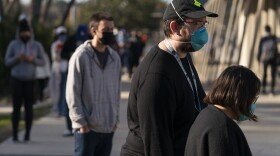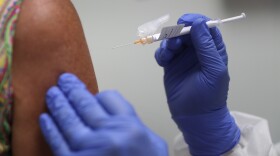
Jane Greenhalgh
Jane Greenhalgh is a senior producer and editor on NPR's Science Desk.
She produces the weekly Health segment on NPR's Morning Edition and writes and edits for NPR's health blog, "Shots." Greenhalgh also produces stories on science, health, and global health across NPR's many platforms.
Greenhalgh was part of the team of broadcast, digital, and multimedia journalists who produced the 2015 award-winning series "#15Girls," which examined the struggles teenage girls face throughout the developing world. Greenhalgh's story "Banished to the Shed" was one of NPR's most listened to and viewed stories of 2015.
She has twice won The American Association for the Advancement of Science award: In 2020 for her work on Victoria's Story: Gene editing helps people with sickle cell, and for NPR's 2014 series "The human microbiome: guts and glory." Greenhalgh also won The National Academies of Science Communication award in 2014, and she was part of the digital team which won for the 2009 series Climate Connections. She traveled extensively for this year-long, multi-platform project, examining how climate change is affecting people across the globe. From Timbuktu, where the desert nomads are giving up their way of life, to Peru, where potato farmers are moving their crops higher up the mountain, and to Bangladesh, where scientists are experimenting with drought and flood resistant rice, the stories Greenhalgh produced chronicled the impact of climate change.
Greenhalgh has traveled extensively covering health issues in developing countries, including cholera in Haiti, polio in Indonesia, tuberculosis in Kenya, AIDS in India, malaria in the Gambia, malnutrition in Bolivia, and menstrual health in Nepal.
-
The rate at which women in the U.S. are dying from pregnancy related causes more than doubled in recent decades. A new study, published in JAMA shows Black women and Native Americans are most at risk.
-
Toxic metal can be harmful to developing brains. New lead targets are part of a broad FDA imitative to reduce children's exposure to the lowest levels possible.
-
Americans' life expectancy dropped for the second year in a row and is the biggest drop since the 1920s. COVID-19 is driving the downward trend, according to CDC data.
-
Declaring a public health emergency can free up resources to help the administration respond to the monkeypox outbreak. So far more than 6,000 people in the U.S. have been infected.
-
People who are 50 and older and certain immunocompromised individuals may get a second Pfizer-BioNTech or Moderna COVID-19 vaccine booster four months after they received the first.
-
Those who contracted COVID-19 can end their isolation after five days while continuing to wear a well-fitting mask for an additional five days, according to the agency.
-
The Food and Drug Administration is expected to announce later this week that it is authorizing boosters for people 18 or older, even if they aren't at risk for severe disease.
-
Kids ages 5 to 11 will soon be able to get Pfizer's low-dose COVID vaccine. CDC director Rochelle Walensky agreed with a unanimous decision of a team of advisers that the benefits outweigh the risks.
-
People with weakened immune systems who already got two doses of the Pfizer or Moderna COVID-19 vaccines can now get a third shot. But exactly who is eligible? Here's what we know so far.
-
The FDA amended its emergency use authorizations for the Pfizer and Moderna vaccines to allow for an additional dose for some immunocompromised people.










